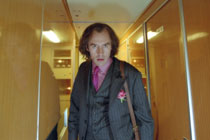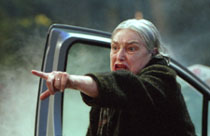   |  | |
   |  | |
|
In Planet of the Apes, Mark Wahlberg went where Charlton Heston had first trod. Now, he follows in Cary Grant's footsteps in a remake of Charade. Needless to say, these are big shoes to fill. No one like Grant is currently working in Hollywood and only a handful of actors (at most) in the entire history of cinema have ever approached the same level of sophistication and charisma as Grant. Wahlberg served as a relatively slight lead, compared to Heston, in Planet of the Apes, and although Wahlberg isn't without charm, in The Truth About Charlie, he never becomes more than a meek shadow of the great Grant.
To be fair, though, The Truth About Charlie isn't a standard remake. With movies such as The Silence of the Lambs and Married to the Mob to his credit, director Jonathan Demme is one of the most highly regarded directors working in Hollywood, and here he strives to distance his movie as much as possible from Stanley Donen's Charade. Realizing that the original film is still highly considered and highly visible (thanks to recent release on DVD), Demme tries to short circuit the "why a remake?" questions by crafting a different take on the material altogether.
While much of the plot will remain familiar to those people who know Charade, Demme has re-envisioned the mystery plot with large dollops of French New Wave stylistics. But instead of representing a new philosophical and political approach to filmmaking (as in the original New Wave movement), The Truth About Charlie is a relatively empty stylistic exercise. Demme has reduced a significant film movement to nothing more than camera and editing techniques. The shaky, spinning, hyperactive camera movements -- which are supplemented by jump cuts and loud blasts of noise -- become horribly out of place, a horrible affectation that reeks of imitation. Instead of creating realistic, documentary-like images, Demme gives us self-conscious, jittery images that occasionally recall low-budget, made-for-TV offerings. Nothing spontaneous happens here. Nearly every frame screams "THIS IS A MOVIE!" This is maybe the most ill-advised and ill-executed remake of the past quarter century.
Even if you can somehow forget about Cary Grant in the original version of this story, Mark Wahlberg still doesn't fare particularly well here. It's no surprise that his greatest success as an actor came while playing a dumb-as-a-post porn star in Boogie Nights. His face doesn't convey a sense of the past. He's a relatively slight presence (although I suspect his authority as an actor will increase greatly as he ages, for his charisma is undeniable).
Meanwhile, Thandie Newton fares fairly well in the role that Audrey Hepburn once played. She plays a confused newlywed, named Regina Lambert, already contemplating divorce, who arrives home after a vacation to discover her apartment has been completely cleaned out -- rugs, curtains, everything is gone. And soon after, the police arrive and deliver the news that her husband is dead. And thus enters Mark Wahlberg as the romantic lead who offers to help her through this crisis, but helping Regina isn't particularly easy because a trio of desperate individuals are eager to uncover the money that they believe Mr. Lambert stole from them. They're convinced Regina has the money, even if she doesn't know she has it. And Tim Robbins plays the American agent who supplies her with some key insight into the goings-on (in a role played by Walter Matthau in Charade).
Newton carries a remarkable presence. She is regal but human. She is elegant but vulnerable. She carries some of Hepburn's flightiness in Charade, but Demme has envisioned her as a more conventional woman in distress. And with this change goes much of the romantic chemistry of the original movie. While Charade balanced its mystery and intrigue with large doses of comedy and romance, The Truth About Charlie eschews comedy and stiff arms the romance. Nary a romantic spark arcs between Wahlberg and Newton. Meanwhile, Robbins contributes little. Unlike Walter Matthau in the original, Robbins' role places him in a relatively controlled and subdued mode, and as a result, he's much less fun to watch. And so goes much of the movie in general.
While Charade was arguably the best of all thrillers made in the Hitchcock style, The Truth About Charlie is a clumsy movie that strives to be brash and surprising, but it ends up being irritating and dour.
Studio Web site: Universal Pictures
|
|